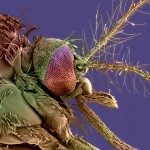Lien vers Pubmed [PMID] – 22123944
Proc. Natl. Acad. Sci. U.S.A. 2012 Jan;109(1):255-60
Wolbachia inherited bacteria are able to invade insect populations using cytoplasmic incompatibility and provide new strategies for controlling mosquito-borne tropical diseases, such as dengue. The overreplicating wMelPop strain was recently shown to strongly inhibit the replication of dengue virus when introduced into Aedes aegypti mosquitoes, as well as to stimulate chronic immune up-regulation. Here we show that stable introduction of the wMel strain of Drosophila melanogaster into Aedes albopictus, a vector of dengue and other arboviruses, abolished the transmission capacity of dengue virus-challenged mosquitoes. Immune up-regulation was observed in the transinfected line, but at a much lower level than that previously found for transinfected Ae. aegypti. Transient infection experiments suggest that this difference is related to Ae. albopictus immunotolerance of Wolbachia, rather than to the Wolbachia strain used. This study provides an example of strong pathogen inhibition in a naturally Wolbachia-infected mosquito species, demonstrating that this inhibition is not limited to naturally naïve species, and suggests that the Wolbachia strain is more important than host background for viral inhibition. Complete bidirectional cytoplasmic incompatibility was observed with WT strains infected with the naturally occurring Ae. albopictus Wolbachia, and this provides a mechanism for introducing wMel into natural populations of this species.

